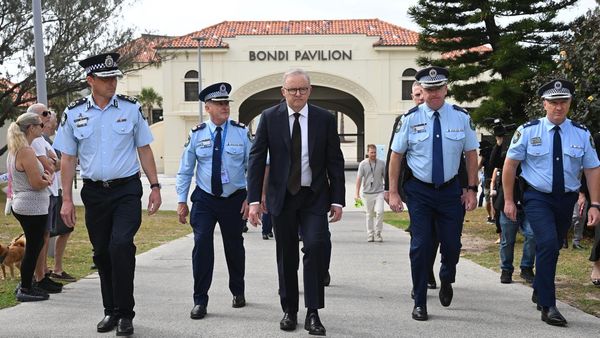
For the last few weeks, Bombay Bicycle Club have been teasing that the top secret special guest on their new album might “shock a lot of people”. Now the secret is out, and it’s none other than Chaka Khan. The 10-time Grammy winning superstar behind such hits as 70s funk smash Ain’t Nobody (with Rufus) and the Prince-penned early 80s pop-dance colossus I Feel for You adds her trademark uplifting vocals to Tekken 2, a joyously funky track on the band’s sixth album, My Big Day. “It was incredible when she said yes,” says singer Jack Steadman. “Such an honour. We couldn’t believe it.”
The unlikely collaboration came about after Steadman played the track to Damon Albarn (who also sings on the album), explaining that there was a section that he was trying to sing in a certain way, and “just wasn’t nailing it. I asked him: ‘Can you think of anyone who would be amazing? And he surprised me by saying: ‘Just ask Chaka Khan.’”
At first, Steadman thought that there was no way a singer whose previous collaborators include Stevie Wonder and Miles Davis would entertain an indie band from Crouch End, north London. “But on the way home I thought: ‘What have we got to lose by asking?’”
“I really liked the song,” Khan says, joining us on an audio call from her home in Los Angeles, “and the message was right up my alley, in line with my philosophy.” Named after the 90s video game, Tekken 2 is inspired by the feelings of “togetherness and community” Steadman experienced while playing in arcades during childhood. He has been excited to see Khan’s role in the song’s music video; she filmed her part in LA’s Topanga Canyon, wearing a dress she designed herself.
“We’re these spotty nerdy kids playing video games,” he chuckles. “Then it cuts to Chaka, this beautiful magical spirit in the glorious California outdoors.”

Rather than collaborate remotely, Steadman jumped on a plane to LA to record Khan’s vocals in person, in one of her favourite studios near her home. “I have this funny memory of walking in and the mixing desk was the size of an entire house,” he remembers. “I’d just brought my laptop and plugged Chaka into that, but I thought it was so embarrassing that I wasn’t using all this stuff.”
“But I thought that was really cool,” Khan says warmly.
Steadman admits to initially feeling daunted, “until I stepped into the room. Chaka’s family all showed up and the whole vibe was so communal and supportive. And Chaka herself was really down to earth. I immediately felt relaxed.”
“We were musician to musician,” Khan tells him. “When you told me that your two-year-old son loved this song, that was where my head and heart was at.”
Khan, 70, and Steadman, 33, have more things in common than parenthood. Both started performing young. Bombay Bicycle Club’s first gig was in a school assembly, “with everyone not really listening to us”. Khan formed the Crystallettes with her sister Bonnie when she was just 11 and sang in various Chicago groups while still underage. “The clubs would have been shut down if they’d known how old I was,” she laughs.
Steadman concurs. “We were buying fake IDs to get into the clubs we were playing in.”
Bombay Bicycle Club’s big break was winning a battle of the bands that landed them a slot at the 2006 V festival. Eight years later, they scored a UK No 1 with their fourth album So Long, See You Tomorrow. For Khan, fame came when she was spotted by members of Rufus – the band she fronted for a decade – in 1972. “You’re on the stage, someone recognises your talent,” she says. “It was just like in the movies. I don’t know if people get discovered that way any more.”

However, they have very different experiences of the music business. “When I joined Rufus, I was the only black person in the band,” Khan remembers, “but then three members quit and the new members were black. We did a show in Illinois and the club owner went: ‘That’s not who I saw on the cover.’ He actually stuck three other [white] guys up there with their instruments not plugged in. Another time, I was on stage and somebody actually shot out our amplifiers.”
Steadman has never had such horrific experiences, but does remember stage invasions in which the audience ruined their equipment. “Then you’d get back to the dressing room and your stuff’s all been stolen.” Having signed a record deal at just 16, he now realises his band were vulnerable in other ways. “We’re very lucky that we’ve had the same manager the whole time. He really guided us through that experience and we couldn’t have done it without him.”
“I must have had 10 managers!” Khan laughs. “Some have been supportive and some have been in bed with the labels.” She has never liked the way the industry “creates competition between artists. They don’t want us to come together.”
Khan recalls how Robert Palmer’s 1986 global smash Addicted to Love was originally a duet with her. “It was fabulous, but they took my vocal off,” she says. “Robert was devastated. He made sure I got the credit for the backing vocal arrangement, but that was a massive blow. I think the racist word comes in.” Such experiences left her “quite bitter for a while. But you overcome that and you start to make your own way”.
Today’s stars face very different pressures. Back then, audiences knew little about their favourites’ private lives, but today so much is public. Bombay Bicycle Club recently put a picture of their younger selves on social media. “It shows that it’s not a facade, it’s real,” says Steadman. “It’s letting people into the process.” But both are careful to retain some privacy, especially when it comes to their children and personal lives. Khan is used to being recognised at the grocery store. “They whisper: ‘Is that …?’ Then I open my mouth and they go: ‘It’s her!’” she chuckles.
Steadman frets about how younger generations have grown up with so much of their lives on show. “It’s become normal to get everything out there.”
“In this business, you have to take precautions,” agrees Khan. “I had one instance where someone tried to pick up one of my kids from school. That scared the hell out of me. The upside is that it’s much easier to own your own music, and you can cut a CD in your hotel room. That’s a beautiful thing.”
“That’s exactly what I was doing after we recorded in LA,” says Steadman. “I was working on our track in my hotel room.”
Our time is up, but perhaps this won’t be the last we hear of this unlikely union. “It sounds cheesy but only something like music could bring people like me and Chaka Khan together,” he says. “What a strange meeting of minds, but it feels so natural.”
Khan agrees. “It’s an art form where people can come together and create a beautiful story. Music isn’t competitive sport. When we collaborate, we make it richer.”
Tekken 2, featuring Chaka Khan, is out now. Bombay Bicycle Club’s album, My Big Day follows on 20 October, with a UK and Ireland tour beginning in January 2024.







